Key takeaways:
- Breaking down complex skills into manageable parts can ease the learning process and make it more enjoyable.
- Technology facilitates personalized learning experiences and fosters collaboration among learners.
- Setting specific goals and integrating personal interests enhances engagement and motivation in skill acquisition.
- Building a support network and seeking feedback can significantly accelerate learning and provide valuable insights.
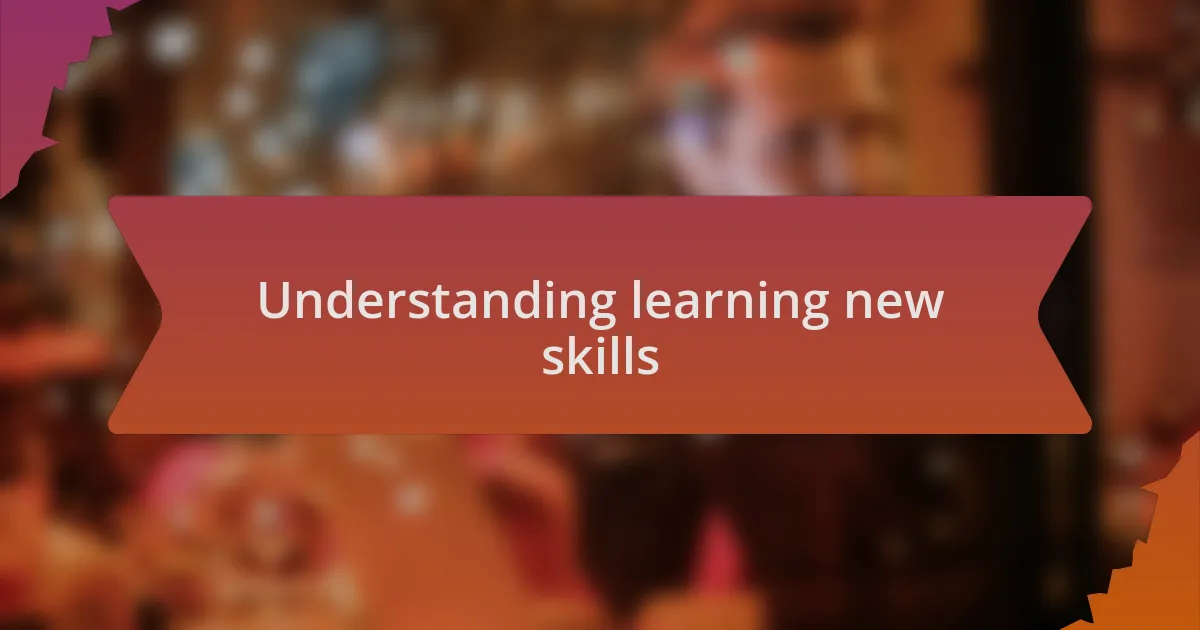
Understanding learning new skills
Learning new skills can sometimes feel overwhelming, especially when diving into complex subjects like technology. I remember trying to learn coding; the initial confusion was daunting. Have you ever found yourself staring at a screen, feeling completely lost? It’s during these moments that I realized the importance of breaking things down into manageable parts.
One effective method I’ve found is to immerse myself in the subject. For instance, when I picked up graphic design, I started by recreating simple designs I admired. This hands-on approach allowed me to connect theory with practice. Have you tried learning through imitation or practice? That can often be a game-changer, making the learning experience both tangible and relatable.
Moreover, I’ve discovered that consistency trumps intensity. Instead of cramming, I dedicate small chunks of time each day to practice. During my journey to learn a new language, those daily 15-minute sessions made all the difference. How do you approach regular practice? Finding a rhythm can be transformative in mastering new skills.
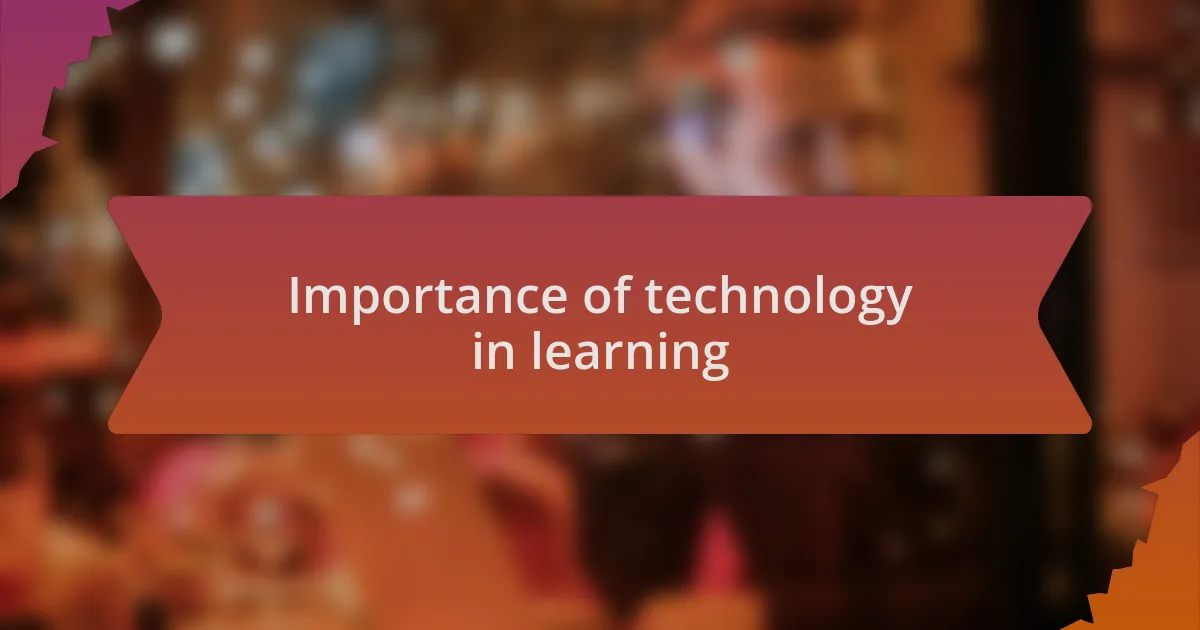
Importance of technology in learning
Technology has fundamentally reshaped how we learn, providing limitless resources at our fingertips. I fondly recall the time I wanted to master a new software tool for video editing. Instead of navigating through dense manuals, I turned to online tutorials and forums, which helped me grasp complex techniques in a fraction of the time. Isn’t it remarkable how a simple search can lead to a treasure trove of knowledge?
Moreover, technology creates a more personalized learning environment. I remember experimenting with various educational apps to find one that matched my learning style—some were interactive, while others offered structured lessons. With the ability to learn at my own pace, I felt more in control of my progress. Have you ever found that particular app that just clicks for you? It’s a game-changer when technology aligns with your learning needs.
This digital age also fosters collaboration among learners. When I embarked on learning a new programming language, I joined an online community where I could share challenges and celebrate wins with others. The motivation from peers was invigorating. How often do you engage with others while learning? The power of connection through technology is undeniable and often makes the journey enjoyable and productive.
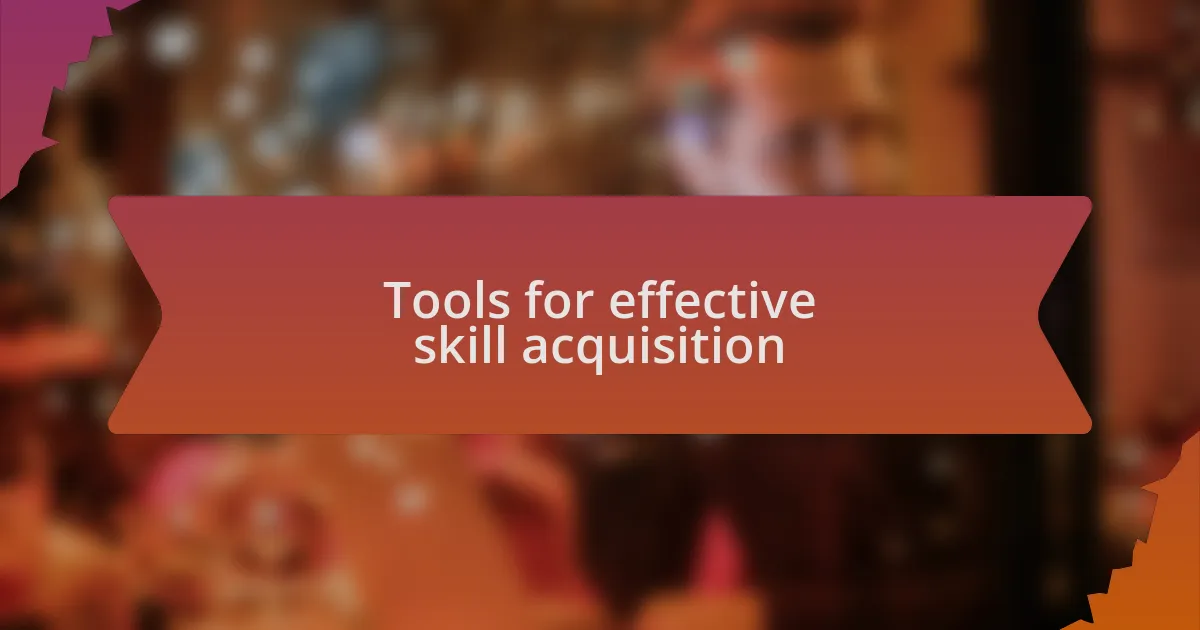
Tools for effective skill acquisition
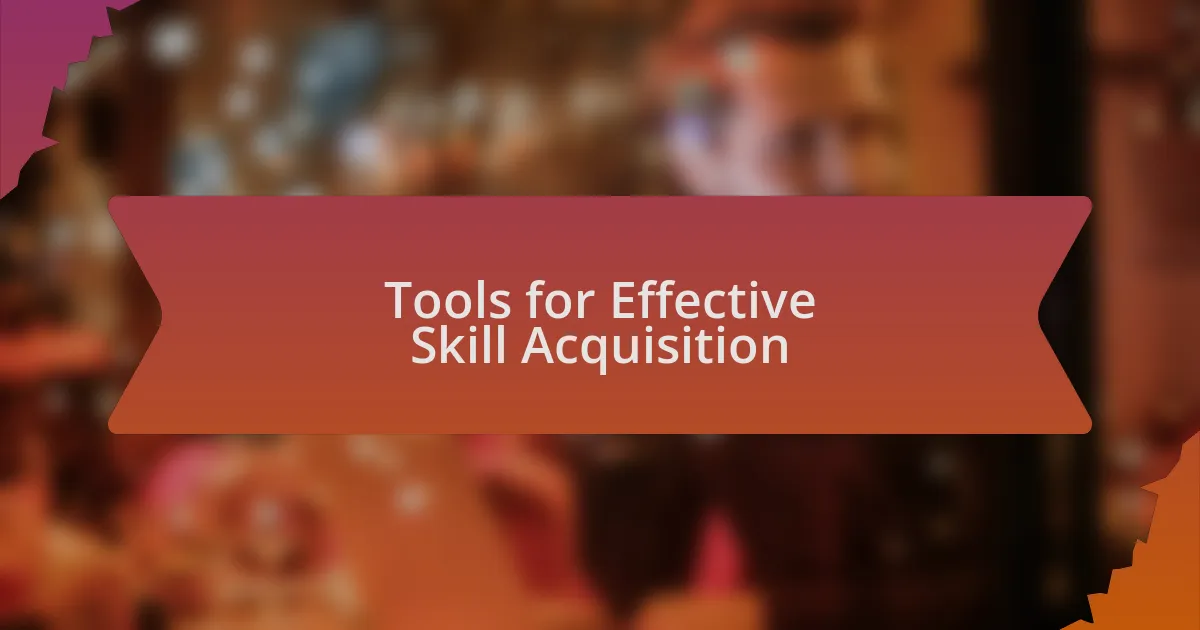
Tools for Effective Skill Acquisition
In my journey of acquiring new skills, I’ve found that leveraging online platforms like Coursera or Udemy can be incredibly effective. I remember signing up for a coding boot camp on one of these sites—a flexible course that allowed me to dive deep into topics at a pace that felt comfortable. Isn’t it fascinating how structured courses can transform a daunting subject into manageable bites, making learning feel more like an exciting adventure?
I’ve also discovered the power of practice software, such as coding sandboxes for programming. During my quest to understand JavaScript, using real-time code editors helped me see immediate results from my attempts. Each mistake was an opportunity to learn, and I still find joy in the “aha” moments when everything clicks. Have you ever had that exhilarating feeling when a complex concept suddenly makes sense? It’s worth seeking out tools that facilitate that kind of experiential learning.
Lastly, I can’t stress enough the value of resource aggregators like Skillshare or LinkedIn Learning. When I wanted to explore graphic design, I used these platforms to find bite-sized tutorials and workshops. The convenience of having so much curated content in one place can ignite inspiration and drive. Isn’t it empowering to know that the path to new skills is often just a few clicks away? Each new tool I adopt adds another dimension to my skill acquisition journey, making it not just effective but also enjoyable.
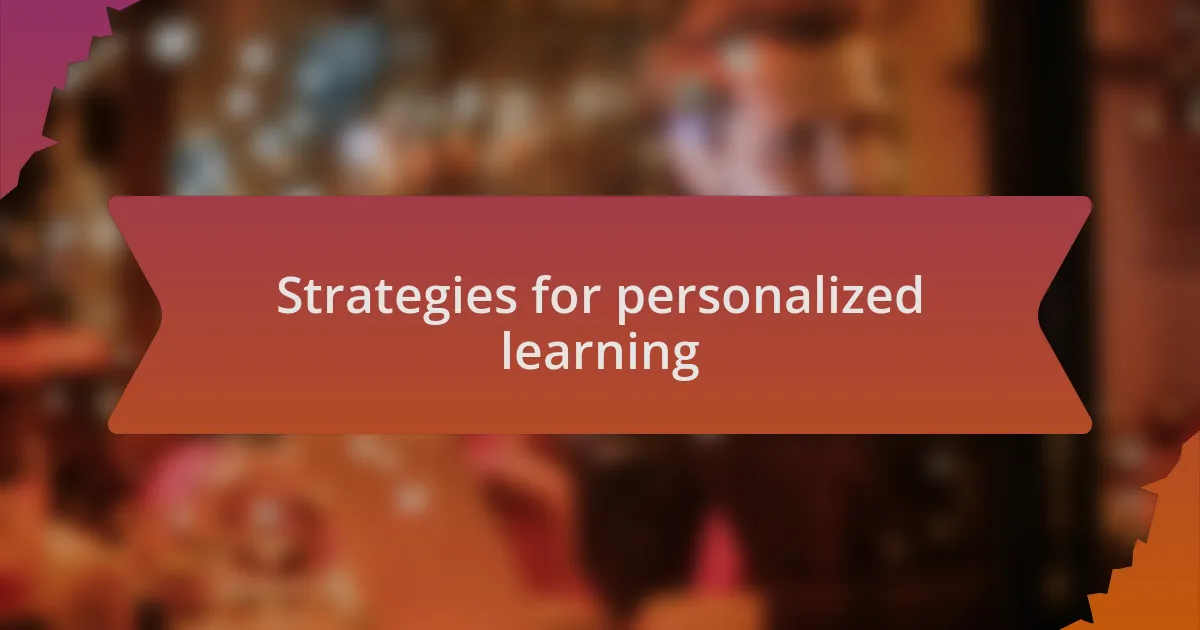
Strategies for personalized learning
Personalized learning offers a unique opportunity to tailor the educational experience to individual needs. I remember when I decided to focus on learning graphic design; I created a detailed study plan that included specific goals and milestones. Breaking down my learning into smaller, achievable tasks felt less overwhelming and more motivating. Have you ever tried setting personal benchmarks? It’s amazing how tracking progress can boost your commitment.
Another strategy is to seek out feedback from peers or mentors throughout the learning process. During my attempts to master public speaking, I would often present my ideas to friends and ask for critiques. Their insights revealed areas for improvement that I hadn’t noticed on my own. What if you made it a habit to share your work regularly? Constructive criticism can lead to rapid growth and significant breakthroughs in skill acquisition.
Finally, I found that integrating personal interests into my learning journey makes the experience more engaging. For instance, I sometimes incorporate themes from my favorite movies into programming projects. This creative approach not only keeps me invested but also reinforces the skills I’m trying to learn. Don’t you think that blending passion with learning not only enhances retention but also makes the journey much more enjoyable?
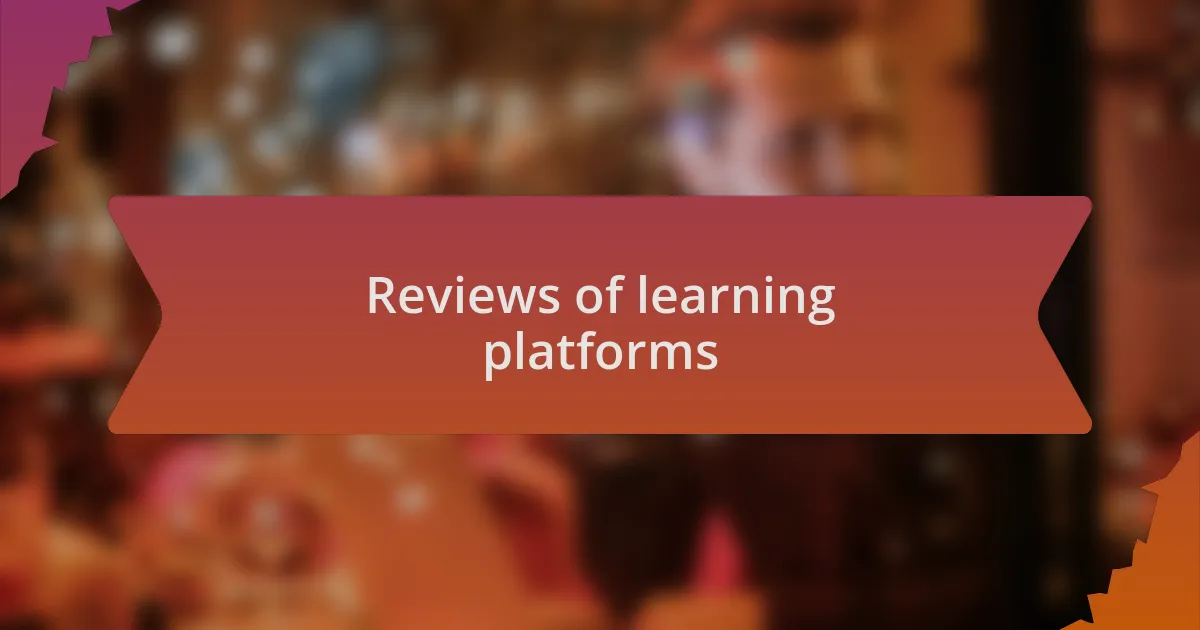
Reviews of learning platforms
When it comes to learning platforms, I’ve had my fair share of experiences. One that really stood out for me was Udemy. The diverse range of courses allowed me to dip my toes into everything from digital marketing to data science. I recall the excitement of completing my first course there; the sense of achievement was unforgettable. Have you ever felt that rush when you finally grasp something new after struggling for a while? It’s like a spark that ignites a desire to learn more.
Another platform I’ve explored is Skillshare, which emphasizes creativity. I remember starting a course on illustration and being pleasantly surprised by the interactive community. Engaging with fellow creatives not only provided me with useful tips but also built my confidence as I shared my own work. You might wonder how much peer interaction really matters; for me, it transformed a solitary experience into a collaborative journey filled with inspiration.
Then there’s Coursera, which offers courses from top universities. I once took a course on artificial intelligence and was blown away by the quality of the material. The rigorous structure encouraged me to push my boundaries, even on days when motivation was low. How do you keep yourself motivated during challenging lessons? I’ve found that having access to high-caliber content, along with a supportive community, makes all the difference in holding me accountable.
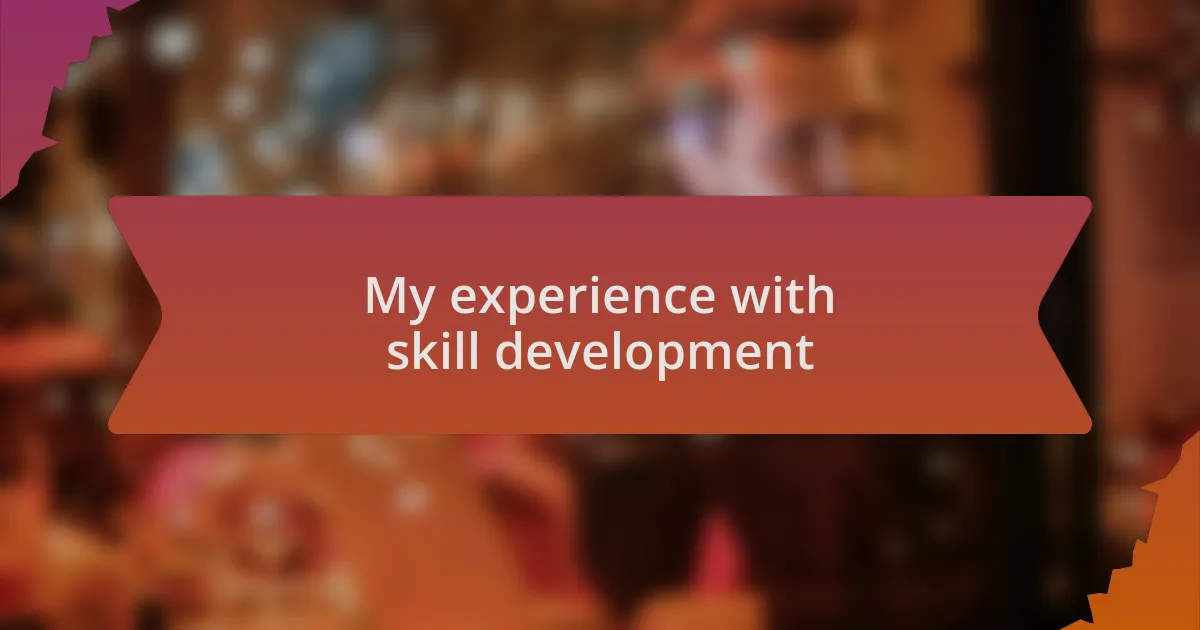
My experience with skill development
My experience with skill development has been a journey of trial and error. For instance, when I first tried learning guitar through YouTube tutorials, it felt overwhelming. I remember my fingers aching after those initial sessions, yet each small improvement kept me going. Have you ever felt like giving up on something you really wanted to master, only to discover that perseverance brings its own rewards?
I also found that setting specific goals made a significant difference in my progress. When I decided to write a blog about my technical projects, I quickly realized the importance of structure in my writing. Each post was a chance to refine my skills, and I vividly recall the moment I finally felt confident enough to share my work with others. What’s been a pivotal moment in your learning? For me, that leap into sharing was both terrifying and exhilarating.
Participating in webinars has frequently boosted my learning experience as well. I distinctly remember attending a live coding session where the instructor welcomed questions throughout. It felt like a conversation, not a lecture. The instant feedback and community engagement transformed abstract concepts into something tangible. How often do you find opportunities to interact with experts? I believe those moments of connection can elevate the learning experience significantly, making even complex subjects feel accessible.
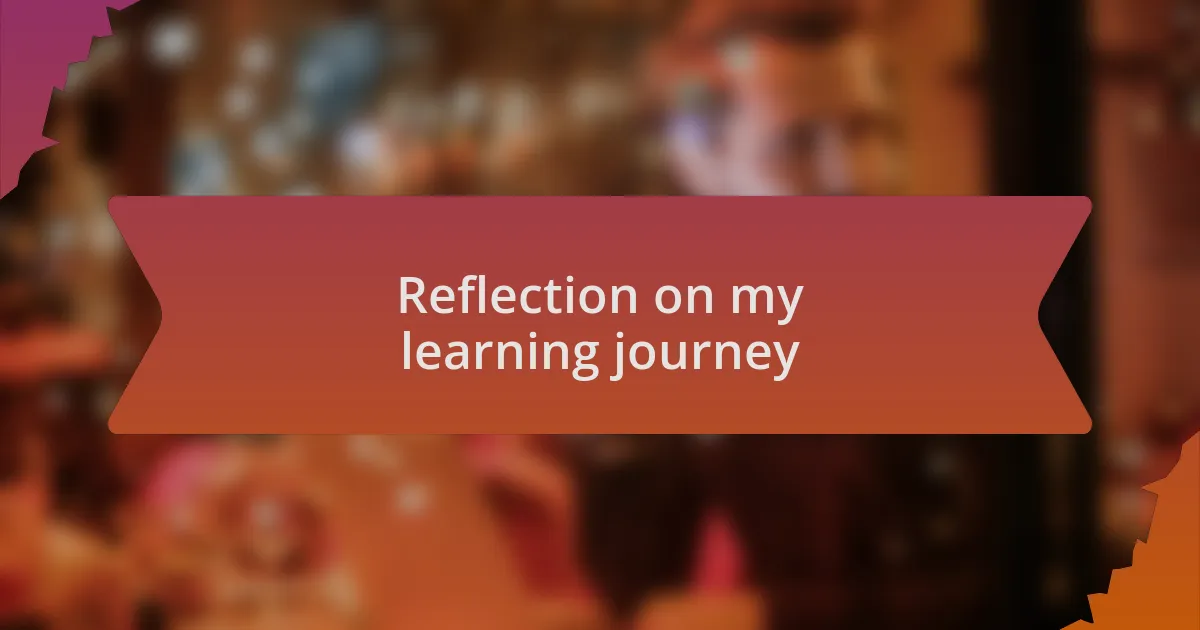
Reflection on my learning journey
Reflecting on my learning journey brings me back to those late nights spent debugging code, the frustration palpable as I stared at the screen. There was a moment when I almost tossed my laptop aside in despair. Yet, I vividly recall that feeling of triumph when I finally resolved an issue that had stumped me for days. Have you ever felt that rush when everything clicks into place, transforming confusion into clarity?
Each step has taught me the importance of self-compassion. I remind myself that mastery doesn’t happen overnight. When I struggled with a new programming language, my instinct was to be critical. However, I soon learned to celebrate the small victories, like finally understanding a tricky concept. How do you typically treat yourself during tough learning phases? I found that shifting my mindset turned setbacks into stepping stones rather than roadblocks.
Building a support network also played a pivotal role in my journey. I recall reaching out to a couple of friends who were also learning similar skills. Our shared experiences fostered an environment where we could openly discuss our struggles and brainstorm solutions together. How vital do you think community is in mastering new skills? For me, that camaraderie not only enhanced my understanding but also turned solitary challenges into collective adventures.